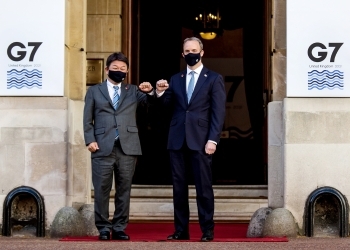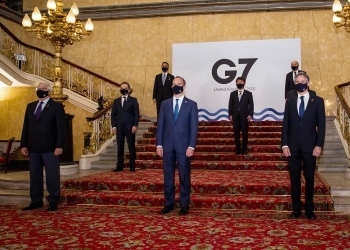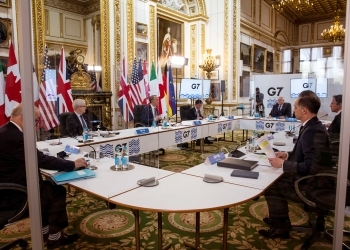G7/G8
G7 Foreign and Development Ministers’ Meeting
 Foreign Minister Mogi arrived at the venue
Foreign Minister Mogi arrived at the venue
 Attendees at the G7 Foreign Ministers' Meeting
Attendees at the G7 Foreign Ministers' Meeting
 Morning session
Morning session
From May 3 to 5, Mr. MOTEGI Toshimitsu, Minister for Foreign Affairs of Japan, attended the G7 Foreign and Development Ministers’ Meeting held in London. The meeting was attended by the Foreign Ministers of all G7 countries and the High Representative of the European Union for Foreign Affairs and Security Policy. The Foreign Ministers of Australia, India, South Korea, South Africa, and Brunei (ASEAN chair) attended parts of the meeting as outreach countries, and Development Ministers from some G7 countries participated online in development-related sessions. An overview of the meeting is as follows.
After the meeting, the following documents were issued.
(1) G7 Foreign and Development Ministers' Meeting Communiqué (English/Japanese (PDF)  )
)
(2) Annex to the Communiqué
- Statement on Defending Democracy from Foreign Threats and Championing Shared Values (English (PDF)
 /Japanese (PDF)
/Japanese (PDF)  )
) - G7 Foreign and Development Ministers’ Equitable Access and Collaboration Statement
- A Declaration on Girls' Education (English (PDF)
 /Japanese (PDF)
/Japanese (PDF)  )
) - G7 Famine Prevention and Humanitarian Crises Compact (English (PDF)
 /Japanese (PDF)
/Japanese (PDF)  )
)
1. Regional Situation
(1) North Korea
Minister Motegi pointed out that while North Korea is said to be facing severe economic conditions due to COVID-19 in addition to sanctions, they continue to advance nuclear and missile development even under these circumstances, as evidenced by the ballistic missile launch in March. Minister Motegi called upon close cooperation among the G7members to deal with the challenge. The Minister also requested G7’s continued full understanding and cooperation for the immediate resolution of the abduction issue, and received support from all G7 members.
U.S. Secretary of State Blinken explained the U.S.’s North Korea policy review, and the G7 concurred that it is critically important to adhere to the goal of North Korea’s dismantlement of all weapons of mass destruction and ballistic missiles of all ranges in a complete, verifiable and irreversible manner, as well as the full implementation of the relevant UN Security Council resolutions.
(2) China
The ministers unanimously expressed concern regarding practices that undermine a free and fair economic system and affirmed G7's commitment to work together to foster global economic resilience in the face of arbitrary, coercive economic policies and practices.
They shared grave concern over the human rights situation in Xinjiang and serious concern over the situation surrounding Hong Kong. They concurred to call on China to respect human rights and fundamental freedoms.
They stressed the importance of peace and stability in the Taiwan Strait and shared the view to encourage a peaceful resolution of cross-strait issues. They also shared the view to support Taiwan's meaningful participation in international organizations, including the World Health Assembly.
Minister Motegi expressed grave concern over the continuation and strengthening of China's unilateral attempts to change the status quo in the East and South China Seas, including the legislation of China’s Coast Guard Law. He emphasized the importance for the international community, with G7 at its center, to send a unified message on the situation in Xinjiang and Hong Kong. He stated that he directly conveyed his grave concerns to China, including through a telephone talk with State Councilor and Foreign Minister Wang Yi.
(3) Myanmar
The G7 once again strongly condemned the military coup and called on the Myanmar military to end the state of emergency, restore power to the democratically-elected government, and release all arbitrarily detained persons including State Counselor Aung San Suu Kyi and President Win Myint. They also condemned the violence committed by the Myanmar military and police.
The G7 reiterated their solidarity with all those working towards an inclusive democracy and welcomed ASEAN's efforts to resolve the situation, including the ASEAN Leaders' Meeting on April 24.
Minister Motegi referred to his telephone talks with the foreign ministers of ASEAN countries before and after the Leaders' Meeting where he reaffirmed close coordination with them. He stressed that the G7 should support and closely cooperate with ASEAN's efforts, and the G7 concurred on this point.
(4) Russia, Ukraine
The G7 collectively shared grave concern about the continued negative pattern of irresponsible and destabilizing behavior by Russia, including its military buildup along the Ukrainian border and in Crimea. They reiterated G7’s interest in stable and predictable relations with Russia.
The G7 reaffirmed its support for Ukraine's sovereignty, independence, and territorial integrity within its internationally recognized borders. They concurred to emphasize their support for efforts to fully implement the Minsk Agreements, a diplomatic path toward a political settlement.
Minister Motegi pointed out the importance of coordinating G7’s response to the significant changes in the regional strategic environment, while taking into account Russia's various actions in the international arena.
(5) Indo-Pacific
The Indo-Pacific was discussed at the dinner attended by the Foreign Ministers of G7, as well as Australia, India, South Korea, South Africa, and Brunei, this year's ASEAN chair.
During the dinner, the Ministers discussed the role of the Indo-Pacific region in the global economic recovery and its security challenges. Each country set out its views on the promotion of free trade, potential roles of science and digital technology, infrastructure development, and connectivity initiatives. Maritime security and other regional issues were also discussed.
Minister Motegi stated that it is important for the G7 countries to strengthen their engagement with ASEAN, which is the cornerstone of peace and stability in the Indo-Pacific region. He stated that the G7 should make clear its support for the centrality and unity of ASEAN and the ASEAN Outlook on the Indo-Pacific (AOIP).
2. Open Society
Under the theme of "Open Society," the Ministers discussed (1) freedom of media, (2) cyber governance, (3) freedom of religion and belief, (4) Rapid Response Mechanisms (RRMs), and (5) arbitrary detention.
The G7 is committed to (1) defending freedom of media and condemning intimidation, harassment, and violence against journalists; (2) working together to promote a common understanding of how existing international law applies to cyberspace, (3) promoting freedom of religion and belief and encourage all countries to treat every person equally under the law regardless of their religion or belief, (4) promoting and reaffirm the significance of the Rapid Response Mechanism (RRMs) as a common G7 effort to protect democratic systems from malign foreign activities, and continue engagement in RRMs in various forms, and (5) affirming that arbitrary detention is contrary to international human rights law and working together to oppose actors that engage in arbitrary detention.
3. Sustainable Recovery
(1) Vaccine/Health
The G7 shared the view that it is vitally important to achieve equitable access to vaccines, treatment, and diagnosis throughout the world under the concept of Universal Health Coverage (UHC) in order to overcome the crisis caused by COVID-19.
Minister Motegi called on G7 members to participate in the COVAX Vaccine Summit which Japan will co-host with Gavi in June and to make additional pledges. He explained that Japan has decided to provide approximately US$80 million (approximately 8.7 billion yen) for "Last One Mile Support" to deliver vaccines to people around the world. He stated that approximately $3 billion (approximately 327.5 billion yen) in emergency assistance loans had been already provided to support the economies of developing countries affected by COVID-19 and address their financial needs including medical and health sectors, and announced that Japan will further provide such loan up to approximately $6.4 billion (approximately 700 billion yen) in total.
Minister Motegi called on the G7 to work together to establish guidelines in international organizations to clarify the roles of relevant countries and international organizations in combating infectious diseases in international transportation including cruise ships, which other G7 members supported.
(2) Girls' education and gender, climate change, famine prevention and humanitarian crises
A “Declaration on Girls’ Education” which includes numerical targets was issued to support girls' education that was especially affected by the COVID-19 pandemic. On climate change, the G7 reaffirmed its commitment to mobilizing $100 billion per year in climate finance by developed countries through 2025, and to achieving a balance between mitigation and adaptation. The G7 members also approved the “G7 Compact on Famine Prevention and Humanitarian Crises,” which outlines G7’s commitment to addressing humanitarian crises such as famine that are increasingly more serious due to the COVID-19 pandemic.

